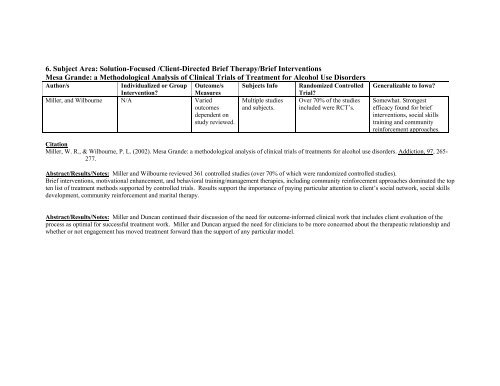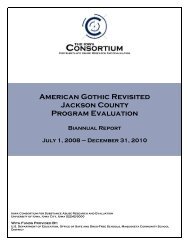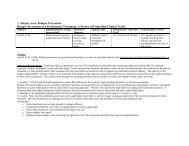1. Subject Area: Solution-Focused /Client-Directed Therapy - Iowa ...
1. Subject Area: Solution-Focused /Client-Directed Therapy - Iowa ...
1. Subject Area: Solution-Focused /Client-Directed Therapy - Iowa ...
- No tags were found...
You also want an ePaper? Increase the reach of your titles
YUMPU automatically turns print PDFs into web optimized ePapers that Google loves.
6. <strong>Subject</strong> <strong>Area</strong>: <strong>Solution</strong>-<strong>Focused</strong> /<strong>Client</strong>-<strong>Directed</strong> Brief <strong>Therapy</strong>/Brief InterventionsMesa Grande: a Methodological Analysis of Clinical Trials of Treatment for Alcohol Use DisordersAuthor/sIndividualized or GroupIntervention?Outcome/sMeasures<strong>Subject</strong>s Info Randomized ControlledTrial?Miller, and Wilbourne N/A Varied Multiple studies Over 70% of the studiesoutcomes and subjects. included were RCT’s.dependent onstudy reviewed.Generalizable to <strong>Iowa</strong>?Somewhat. Strongestefficacy found for briefinterventions, social skillstraining and communityreinforcement approaches.CitationMiller, W. R., & Wilbourne, P. L. (2002). Mesa Grande: a methodological analysis of clinical trials of treatments for alcohol use disorders. Addiction, 97, 265-277.Abstract/Results/Notes: Miller and Wilbourne reviewed 361 controlled studies (over 70% of which were randomized controlled studies).Brief interventions, motivational enhancement, and behavioral training/management therapies, including community reinforcement approaches dominated the topten list of treatment methods supported by controlled trials. Results support the importance of paying particular attention to client’s social network, social skillsdevelopment, community reinforcement and marital therapy.Abstract/Results/Notes: Miller and Duncan continued their discussion of the need for outcome-informed clinical work that includes client evaluation of theprocess as optimal for successful treatment work. Miller and Duncan argued the need for clinicians to be more concerned about the therapeutic relationship andwhether or not engagement has moved treatment forward than the support of any particular model.






